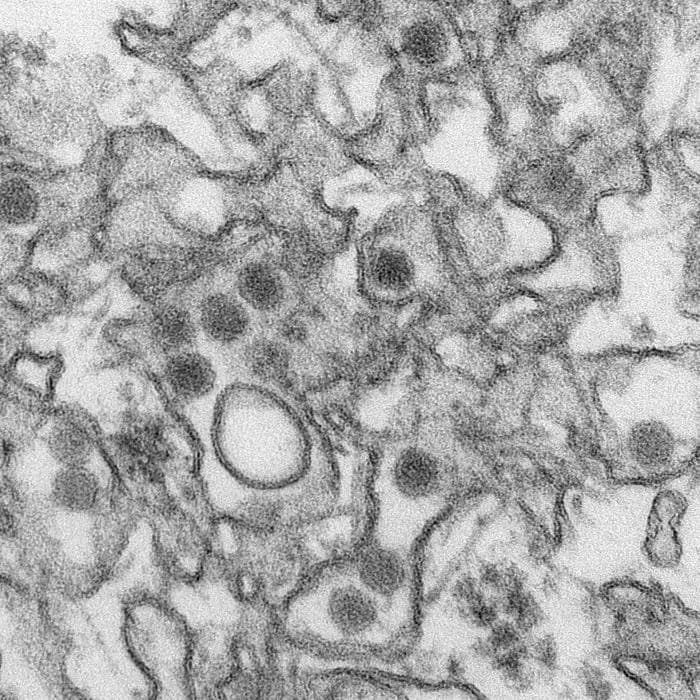What are the other names for this Condition? (Also known as/Synonyms)
- Zika
- Zika Disease
- ZIKV Disease
What is Zika Virus Fever? (Definition/Background Information)
- Zika Virus Fever is an infectious disease caused by the Zika virus. Individuals with the condition typically experience a mild fever, joint pain, rashes, and reddening of the eyes
- Individuals are typically infected with Zika virus when they are bitten by infected mosquitoes
- The virus can be transmitted during pregnancy to the fetus, resulting in an incomplete development of the brain (microcephaly)
- There is currently no known treatment for Zika Virus Fever. It is symptomatically treated to alleviate pain and other symptoms that may arise. However, the prognosis is generally good
- Active research is being undertaken to establish suitable treatment protocols and vaccine for Zika Virus Fever
Who gets Zika Virus Fever? (Age and Sex Distribution)
- Zika Virus Fever is an infectious disease affecting individuals in the tropical regions, including Africa, Southeast Asia, South America, and the Pacific Islands
- The condition affects both males and females
- It also affects individuals of all races and ethnicities; no predilection for any particular race or ethnic group is noted
What are the Risk Factors for Zika Virus Fever? (Predisposing Factors)
The risk factor for Zika Virus Fever is infection with the Zika virus. Additional risk factors for the condition may include:
- Residing or visiting tropical areas; Zika virus is contracted through mosquito bites
- Sexual intercourse with a Zika virus infected individual
- Being born to a mother who is infected with the virus
It is important to note that having a risk factor does not mean that one will get the condition. A risk factor increases ones chances of getting a condition compared to an individual without the risk factors. Some risk factors are more important than others.
Also, not having a risk factor does not mean that an individual will not get the condition. It is always important to discuss the effect of risk factors with your healthcare provider.
What are the Causes of Zika Virus Fever? (Etiology)
- Infection with the Zika virus can result in Zika Virus Fever
- However, not all individuals who are infected by the virus develop signs and symptoms of the disease. Only 1 in 5 infected individuals develop Zika Virus Fever
- Zika virus can be transmitted through infected mosquito bites, sexual contact, and across the placenta, from an infected mother to the unborn fetus
- The virus infects cells of the immune system, leading to inflammation and other signs and symptoms
What are the Signs and Symptoms of Zika Virus Fever?
The signs and symptoms of Zika Virus Fever may not appear until 3 to 12 days after infection with Zika virus. The common signs and symptoms of Zika Virus Fever include:
- Mild fever
- Joint pain (arthralgia)
- Reddening of the eyes (conjunctivitis)
- Red rash covered with small bumps (maculopapular rash)
- Incomplete development of the brain in a newborn child (microcephaly)
- Muscle pain
- Eye pain
- Headaches
- Vomiting
The symptoms typically last a week and may not require a hospitalization. One in five individuals infected with the virus do not develop any symptoms of the infection.
How is Zika Virus Fever Diagnosed?
A diagnosis of Zika Virus Fever may involve the following tests and procedures:
- A total physical examination and screening of the individual’s medical history
- A screening of a travel history to check if the individual has visited an area in which Zika Virus Fever is prevalent
- Blood tests to determine the presence of Zika virus
- Serological testing to determine the presence of antibodies against the virus
Many clinical conditions may have similar signs and symptoms. Your healthcare provider may perform additional tests to rule out other clinical conditions to arrive at a definitive diagnosis.
What are the possible Complications of Zika Virus Fever?
The complications of Zika Virus Fever that can occur include:
- Microcephaly: An incomplete development of the child’s brain recently born to a Zika virus infected mother
- Microcephaly can cause developmental delays and brain damage, leading to a poor life expectancy
How is Zika Virus Fever Treated?
Currently, there is no definitive treatment or cure for Zika Virus Fever. Relief from pain, symptoms, and stress of the disease can be sought through the following treatment measures:
- Remaining on bed rest
- Taking acetaminophen to reduce pain
- Drinking fluids to avoid dehydration
Note: Aspirin should be avoided as it could increase the risk of bleeding.
How can Zika Virus Fever be Prevented?
Currently, there are no vaccines to prevent Zika Virus Fever.
- Zika Virus Fever can be prevented by avoiding those specific areas where it is known that mosquitoes have been found to carry Zika virus
- The use of insect repellants and wearing long sleeves can prevent mosquito bites from occurring, decreasing one’s chance of becoming infected
What is the Prognosis of Zika Virus Fever? (Outcomes/Resolutions)
- There is currently no known cure for Zika Virus Fever. It is typically a short-acting infectious disease. The prognosis is generally good once the virus is cleared from the body
- However, the condition may affect pregnant women more, because Zika Virus Fever may result in an abnormal development of the baby’s brain, leading to a shortened life expectancy
Additional and Relevant Useful Information for Zika Virus Fever:
Although there is currently no cure for Zika Virus Fever, research is actively being undertaken to develop an effective vaccine against the virus.
Related Articles
Test Your Knowledge
Asked by users
Related Centers
Related Specialties
Related Physicians
Related Procedures
Related Resources
Join DoveHubs
and connect with fellow professionals


0 Comments
Please log in to post a comment.